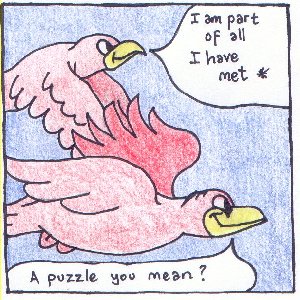Week 6
Building a
community of practice

Recommended Readings
-
Pre-reading for Jason Ward's Chat
-
Blog Assisted Language Learning (BALL):
Push button publishing for the pupils
(pdf file)
Pre-reading for the chat with Gavin and Nicky
- Working together in virtual darkness by Nicky Hockly
- Online
skills sharing is breaching staffroom 'wall of silence' by Gavin Dudeney
and Nicky Hockly
When you have time:
- Stephen Downes' Tagging and Learning Communities (ppt presentation + accompanying mp3 file)
- The network is the blog
- Learning Ecology, Communities, and Networks - Extending the classroom
- Learning in Communities
- Community formation online and its role in language learning
- The Benefits of communities
- Creative use of threaded discussion areas
- Groups that Work
- E-tivities
- Weblog networks as social ecosystems
- Blogs as Virtual Communities: Identifying a Sense of Community
- Communities of Practice: Learning as a Social System
- Blogs and CoPs: Can blogging replace communities of practice?
- Weblog as Online Community Management Tool
- Navigating the Blog Universe
- Online Learning: Social Interaction and the Creation of a Sense of Community (pdf file)
Extra material
Individual TasksThis week you will reflect on how to go about cultivating and maintaining a thriving weblog-based learning community. Successful edublogs are those that engage people and make them want to come back again and again, not only to read posts, but also to participate.
What can we do to encourage this participation and convert our blogs into lively online communities?As in the previous weeks, before you start, you may want to print and fill in this KWL chart before you start. It may help you organize your thoughts and reflection on your blog later.
Step 1: Understanding a community of practice
What is a Community of Practice (CoP) ?
How do they develop and what is needed to make them evolve?
What are the advantages/disadvantages in belonging to one?
Can blogs/wikis help to create one? How?View these ppt slides extracted from ITrain material on Communities of Practice.
Task Set #1
Taking the slides into account, situate yourself inside the group you have collaborated with until now. Review your individual and collective blogs and how these past 5 weeks have worked for you. Check your previous KWL charts and track your steps and progress.
Post your ideas to your individual blog.
Step 2: Creating a blogging community
Taking the readings for this week's chat into account, list what went right or wrong for you, what encouraged or discouraged you and reflect /comment on how this affected your participation.
Task Set #2
Post your ideas to your individual blog.
Step 3: Developing a blogging community
Based on your previous experience and what you have learnt in the past weeks , think about the problems you may face if trying to create a community from a collection of student blogs, and ideas on how to solve them.
Some questions you may want to consider are:
- How can I persuade students to post to their blogs regularly?
- How can I encourage lurkers to participate?
- How can I encourage my students to read and post to blogs other than their classmates?
- How can I encourage people from outside the classroom to post on student blogs?
- How can I encourage students to post and respond to comments to their classmates' blogs?
- How can I keep the interest going when the novelty has worn off?
- How can I design a course that will both build community and encourage continuing participation beyond the limits of the course?
Task Set #3
Again, post your notes to your personal blog. If you find yourself stuck for solutions to any of the problems, check your aggregator to see what the others have posted and then post to your blog.
Collective Tasks
-
Group 1 (wiki) Comparing ideas
Visit some of our group's individual blogs using the aggregator and compare your notes with what they have to say about the individual task #3. Leave some comments on the individual blogs you visit, and pool and list all the problems, grouping them together according to themes on the wiki page.
-
Group 2: (collective blog) Reviewing the jam session
Blog Gavin and Nicky's jam session on your individual blog for the people who were not present. Use the aggregator later to view the different versions and you may want to use the wiki page to draft together the final version before you publish it in the collective blog.
-
Group 3: (collective blog)
Use the wiki to brainstorm collectively about blogs and wikis and how they might be incorporated into existing courses.
What role can these tools play to help us when designing courses for our learners?Post the result of your discussion in the collective blog.
-
Group 4 (wiki) Activities to encourage student participation
Use the wiki to brainstorm collectively and produce a series or sequence of blogging activities incorporating the different ideas that have come up throughtout this workshop and that could be used to help students participate, and to stop interest in blogging from dying.
-
Group 5 (wiki)
Step back and take a look at the collective blog and wiki. How well do the resources that we have developed over these six weeks respond to the needs required of future ESL/EFL bloggers ?
Is there anything missing? Should there be changes made to the blog / wiki to make them more accessible for people who did not attend the course, but who may be interested in using these resources?
